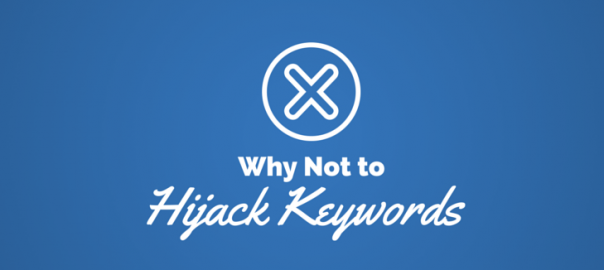
Tricks aren’t just for kids, they’re for adults, too. Well, at least some companies tend to think so. Let’s say you search online for candy corn, click the link, and up pops Aaron Carter’s “I Want Candy” music video.
I’m sure you weren’t looking for Aaron Carter.
Turns out the keyword you just searched was hijacked. This form of bait and switch advertising is an unethical and illegal marketing strategy. You click on a link for one product, only to land on a page featuring something completely different.
No one wants to be ‘Aaron Carter-ed.’ Hijacking a keyword can be a serious problem for both businesses and customers. Here are three reasons why it’s just not worth your time.
1) Breaks Trust with Your Customers
When a person is a ‘victim’ of this deception, they lose their faith and trust in the company. Jamie Grayson’s (TheBabyGuyNYC) first-hand experience is a prime example.
While researching cloth diapers for an upcoming Earth Day #makeclothmainstream newsletter, he googled cloth diapers, and clicked on the first Google ad that popped up: Honest.com/cloth-diapers. Much to his surprise, even though the link clearly says cloth diapers, he was taken to a page featuring disposable diapers. Uh oh. (Note: the Honest Co. has since redirected that link to an “Oh No” page.)
Here, the Honest Co. makes two mistakes:
- There’s a huge difference between cloth and disposable diapers! No parent will be fooled into buying the latter.
- The Honest Co. doesn’t even sell cloth diapers. So clearly, it wasn’t a typo in the link.
Needless to say, ‘TheBabyGuyNYC’ realized what was happening and voiced his concerns online (plus coined the hilarious hashtag: #clothblockers).

In this scenario, the Honest Co. lost this customer’s trust. TheBabyGuyNYC’s Facebook page has over 160,000 likes and a very active following. So it’s no doubt this hijacking damaged Honest’s reputation. Now that’s honestly an epic fail.
2) It Tarnishes Your Reputation
In 2011, Groupon’s reputation was dinged when it was sued for a case of classic bait and switch. San Francisco Comprehensive Tours accused Groupon of purchasing tour-related keywords in Google’s AdWords service. When customers clicked on the links to Groupon, there weren’t any tour-related coupons available. Furthermore, these purchases drove up the cost of purchasing keywords for the tour company, and pushed down the tour company’s placement in Google searches. Consequently, the tour company filed a lawsuit, and Groupon got negative local press.
So why was this such a big deal? Well, Groupon, like many other companies out there, crossed the line of ethics. Sadly, many competing companies prefer the Gordon Gekko mantra of “Greed is Good.” Instead of “marketing legally smart”, they happily throw ethics to the wind in favor of hijacking keywords — all for the chance to make some big bucks. However, more often than not, this behavior will drive your customers away.
3) Bait and Switch Doesn’t Payoff
Targeting competitors’ keywords doesn’t always result in a huge payoff, especially when the company has an inferior product.
Let’s say you search for Coach purses, and click on the ad for 70% off Coach purses.

Naturally, you would expect to see Coach purses and not this:

Umm those are definitely not authentic Coach purses! Here, the company piggybacked on the real Coach’s keyword ‘Coach purses.’ Instead of viewing the latest “It Bag,” you’re looking at “I Love the Wrestling Coach” burlap bags. So not cool.
Here, the difference in quality between the real product and the faux product is glaringly obvious. It’s so bad, it’s not even in the same ballpark as a knockoff Coach bag. So while that burlap bag may only be $ 14.99 instead of $ 140.99, the likelihood of Kanye smiling is higher than a true Coach collector buying that sad burlap sack.
So what did this company actually accomplish? Nothing.
Using their competitor’s name probably boosted traffic to their website, but they made no sales. All they did was annoy the consumer.
What to Do If Your Company’s Keywords Are Being Hijacked
To keep your competitors from tricking your customers, there are a couple of tools you can employ:
- Buy Them Out. Sure it costs money, but companies like the sad burlap sack can be outbid. Your increased bid should place your results higher than this “competition”, or at the very least above the fold, catching your customers’ eyes first.
- Consider a Brand Protection Tool. Detect online brand abuse by using a product like an Auction Insights Report to monitor your brand. Your tool will keep you aware of any competitors who may be hijacking.
- Use Keyword Analysis. Stay ahead of your competitors the right way by using keyword analysis. By doing keyword research, you’ll be able to better predict what users are searching for.
Conclusion
Hijacking keywords negatively affects a company’s reputation and damages its consumers’ trust. While hijacking may boost traffic to a company’s site, the odds of it scoring you new business are slim. Is it worth the ethical implications when the payoff is nil? Probably not.
Digital & Social Articles on Business 2 Community(126)







